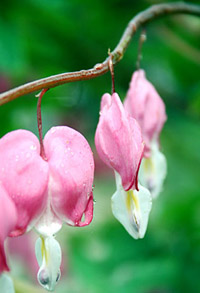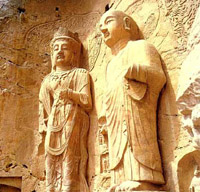| Tools: Save | Print | E-mail | Most Read |
| Luoyang: China's Creative Beautyspot |
| Adjust font size: |
The Tang Dynasty (618-907), with its capital at Chang'an (now Longmen Grottoes, nesting on both banks of the Yi River, is now listed as a World Heritage site by UNESCO. It's home to over 2,300 caves and niches and more than one hundred thousand Buddhist images, as well as 300,000 characters with over 1,500 years of history.
The carving lasted more than 400 years, with Buddhist images varying greatly among the different dynasties. The figures of those images carved during Tang Dynasty are relatively plump, while those in other dynasties are comparatively slim. That tells the concept of beauty in Tang Dynasty; plump women were more attractive than those who were lean and slim. The wearing of the images carved during Tang Dynasty were also obviously gorgeous, however, that of the carved images of other dynasties were quite simple. The Tang Dynasty, the period which reflects the pinnacle of the development social economies, also made itself the peak period of the stone carving craft. The largest Buddhist image, which sits in If not visiting the Longmen Grottoes, how could one get a little clue as to know how smart the Tang person was! But unfortunately, many of the carved figures were stolen and destroyed through ast centuries. Some of them were destroyed by the natural disasters of the times, while still a greater majority of them were destroyed by the Chinese during the movements and Western imperialists during their involvement in Though a lot of vivid sculptures flowed out of April is the best time to visit
Water banquet, originated from The 24 courses of dishes are noted for their various soups with sour and spicy flavors. The different dishes are served continuously like the flow of water; hence it got the name "Water Banquet". (Shanghai Star March 26, 2007)
|
| Tools: Save | Print | E-mail | Most Read |
 |
| Related Stories |
|
Product Directory China Search |
Country Search Hot Buys |


